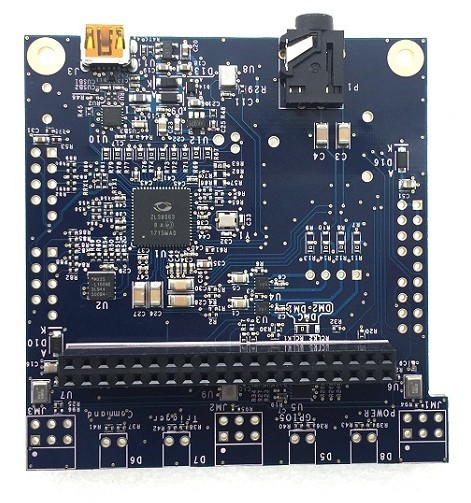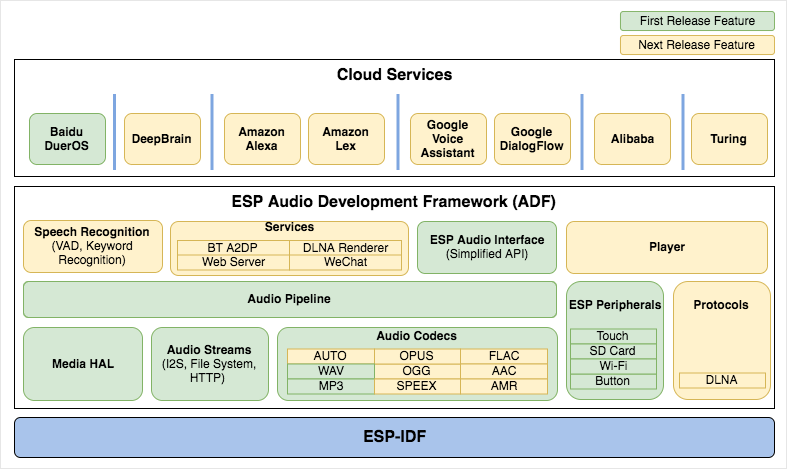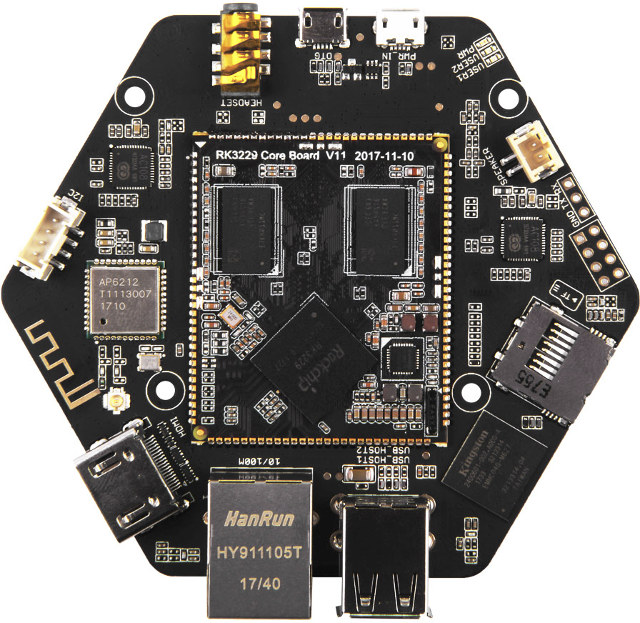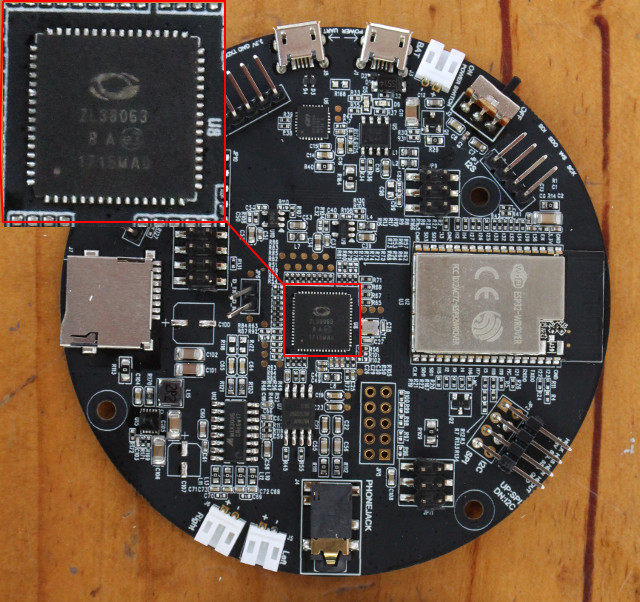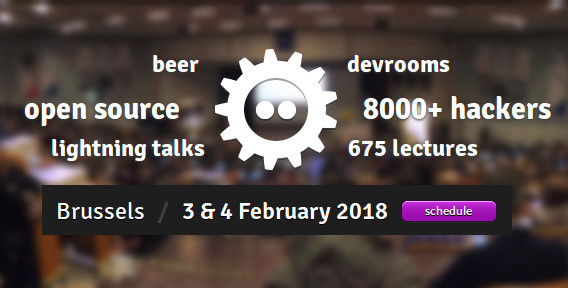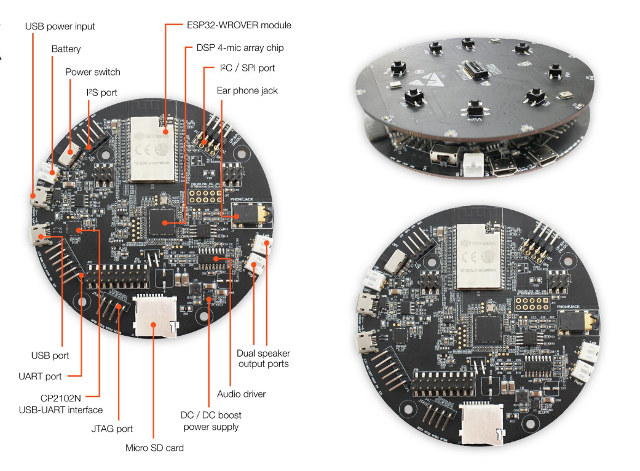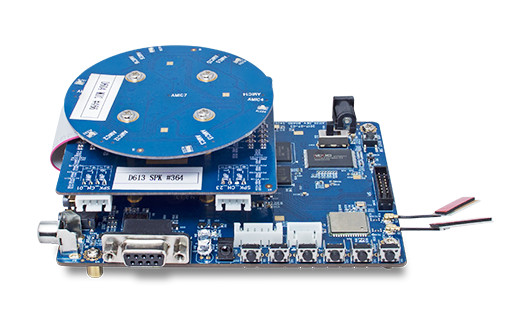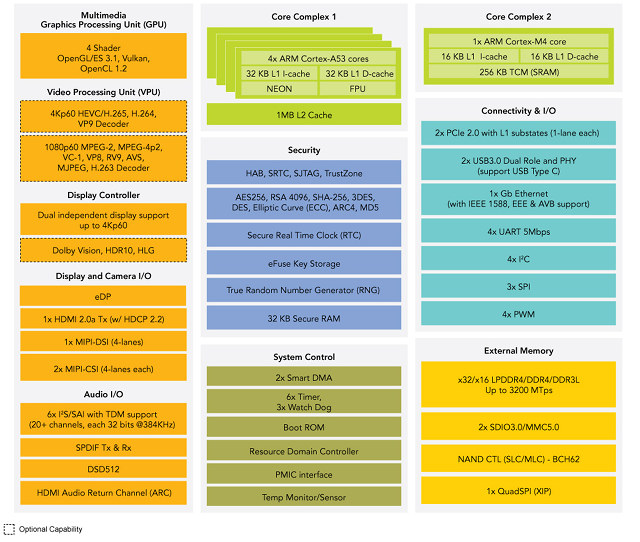SinoVoIP has just launched BPI-AI-Voice development platform for speech recognition on Aliexpress for $169, and excluding the different PCB color, it is a clone of the official $299 Microsemi AcuEdge Development Kit for Amazon AVS, which is based on MicroSemi ZL38063 audio processor and comes with two microphones. BPI-AI-Voice key features: Audio Processor – MicroSemi ZL38063 Storage – U2 SPI flash to store ZL38063 firmware Audio 4x on-board digital microphones (AKU441) supporting a 2 microphone configuration for 180° and 360° audio pick-up. 2x low cost class D audio amplifier (NCP2820) Expansion Headers JMMA1 audio header for digital microphone, analog out, and 3 GPIOs JM1-4 digital microphone headers for off-board microphones 40-pin P2 header to connected to Raspberry Pi 3 (I2S, SPI and 8x GPIO used) Debugging – JAIB2/2 auto tuning headers, micro USB port. Power Supply – 5V via micro USB port Dimensions – 70 mm × 66 mm Temperature […]
Espressif ESP-ADF Audio Development Framework for ESP32 Supports Baidu DuerOS, and Soon Amazon Alexa, Google Assistant, etc…
Espressif Systems have been working on audio applications like Smart Speakers based on ESP32 WiSoC with hardware development kits like ESP32-LyraTD-MSC Audio Mic HDK, and I could test it with Baidu DuerOS using Mandarin language. However, at the time (February 2018), there was not much else that could be done with the hardware kit, since no corresponding ESP32 audio software development kit had been made available. This has now changes since Espressif has just released ESP-ADF Audio Development Framework on Github. The framework will support the development of audio applications for the Espressif Systems ESP32 chip such as: Music player or recorder handling MP3, AAC, WAV, OGG, AMR, SPEEX … audio formats Play music from network (HTTP), storage (SD card), Bluetooth A2DP/HFP Integration with Media services such as DLNA, Wechat, etc.. Internet Radio Voice recognition and integration with voice services such as Alexa, DuerOS, Google Assistant As we can see […]
ReSpeaker Core v2 is a 6-Mic Array Audio Development Kit Powered by Rockchip RK3229 Processor
Seeed Studio launched ReSpeaker Core board designed for voice interaction in 2016. The board was based on a Mediatek MT7688 MIPS WiSoC running OpenWrt, and came with a single built-in microphone, although a microphone array board with 7 microphones and 12 LEDs was also offered as option. The company is now back with a more powerful update of the board – called ReSpeaker Core v2 – featuring Rockchip RK3229 quad core Cortex A7 processor, running Debian Linux, and with 6 on-board microphones. Beside WiFi connectivity, the board also adds Ethernet and Bluetooth 4.0, as well as a USB hot port compared to the previous version. ReSpeaker Core v2 specifications: SoC – Rockchip RK3229 quad core Cortex A7 processor @ up to 1.5 GHz with Arm Mali-400MP2 GPU System Memory – 1GB DDR3 RAM Storage – 4GB eMMC flash, micro SD card slot Video Output – HDMI 2.0 (but drivers not […]
MicroSemi ZL38063 Audio Processor is Designed for Microphone Arrays
I’ve already been experimenting with DIY smart speakers and corresponding services for example using ReSpeaker board with Microsoft Bing Speech API, or Orange Pi Zero with Google Assistant SDK. But so far all the hardware platforms I used only came with one microphone, no microphone array that help with wake word detection in noisy environments. Last week-end, I received Espressif Audio Mic HDK, an ESP32 board with a 3-microphone array which I’ll review a in a few weeks once documentation becomes available and I clear some other items in my review list. In the meantime, I checked out the hardware, and found out the mainboard also comes with Microsemi ZL38063 audio processor specifically designed for microphone array. The chip was released las year, and can be already found in the company’s AcuEdge Development Kit for Amazon AVS, but since I’m going to use a board based on ZL38063 I’d thought […]
FOSDEM 2018 Open Source Developers Meeting Schedule
FOSDEM (Free and Open Source Software Developers’ European Meeting) occurs every year on the first week-end of February, where developers meet for two days discussing about open source software projects. FOSDEM 2018 will take place on February 3-4 this year with 652 speakers, 684 events, and 57 tracks, an increase over last year 608 speakers, 653 events, and 54 tracks. There will be 8 main tracks namely: Community, History, Miscellaneous, Performance, Python, Security and Encryption, Space, and Global Diversity CFP Day. There will also be 33 developer rooms, and since the full schedule is now available, I’ll make a virtual schedule mostly based on sessions from the Embedded, mobile, and automotive, Hardware Enablement, and Internet of Things devrooms. Saturday 3, 2018 09:50 – 10:15 – Turning On the Lights with Home Assistant and MQTT by Leon Anavi In this presentation you will learn the exact steps for using MQTT JSON […]
Espressif ESP32 LyraTD MSC HDK is Designed for Smart Speakers, Wireless Audio and other Smart Home Appliances
[Update February 17, 2018: The kit was previously referred as ESP32 LyRaTD MS1, but the company appears to have changed the name to ESP32-LyRaTD-MSC] So apparently voice command will represent 50% of all searches in the next two years, and everybody is jumping on the smart speaker bandwagon, with announcements from many companies at CES 2018, including Google’s Android Things + Assistant products‘ announcement, NXP i.MX 8M official launch, Amazon Alexa Voice Service (AVS) development kit from Amlogic and Allwinner, and more. Espressif Systems is about to join the party with their ESP32 LyraTD MS1 HDK (Hardware development kit) that most people will likely remember as “Audio Mic HDK” that was announced on Twitter. Espressif Audio Mic HDK specifications: Wireless Module – ESP32-WROVER module with 802.11 b/g/n WiFi and Bluetooth 4.1 LE connectivity. DSP – 4-mic array chip Storage – micro SD card for audio files Audio Audio driver chip […]
Amlogic A113X1 6-Mic Far-Field Devkit is Designed for Amazon Alexa
Allwinner unveiled their SoC-Only 3-Mic Far-Field Development Kit for Amazon AVS last week, but they are now joined by another low cost silicon vendor as Amlogic has just launched their own A113X1 far-field dev kit officially support for Amazon Alexa Voice Service (AVS). The development kit is powered by Amlogic A113X SoC designed for such applications with “an audio pipeline that supports high fidelity audio with soft DSP algorithms for both frontend and backend processing”. Amlogic A113X1 far-field devkit specifications: Mainboard SoC – Amlogic A113X quad core Cortex A53 processor System Memory – 512MB DDR3 Storage – 512 MB NAND flash Connectivity – SDIO WiFi/BT (AP6356S) Audio SPDIF_IN jack LINE_IN/LINE_OUT jacks 2x Audio headers (MIC_Connector & SPK_Connector) USB – 1x micro USB 2.0 OTG port Expansion – SPI header Misc – 6x ADC Keys, IR_IN/IR_OUT, UART Interface (RS232), LEDs Power Supply – 12V/2A Microphone board 6x digital microphones in […]
Develop NXP i.MX 8M Voice Controlled Smart Devices with MCIMX8M-EVK Evaluation Kit
We first heard about NXP i.MX 8M processsors in October 2016, and at the end of last year, WandPi 8M development board was unveiled with shipping scheduled for Q2 2018 once the processor will start manufacturing. Other exciting i.MX 8M projects include Purism Librem 5 smartphone, MNT Reform DIY modular computer, and I’m sure there will be others development board & products, and plenty of system-on-modules introduced with the processor in 2018. NXP i.MX 8M processor also got in the news at CES 2018, because it will be one of the hardware platforms certified for Android Things, and NXP also issued a press release to announced the processor’s multimedia capability with be used in voice controlled devices with or without video. The PR refers to Gartner Research saying that “voice commands will dominate 50 percent of all searches in the next two years”, and explains that with thinner and thinner […]


